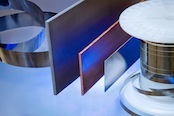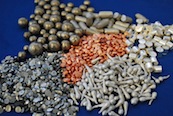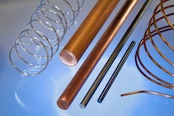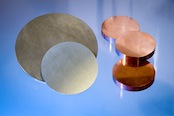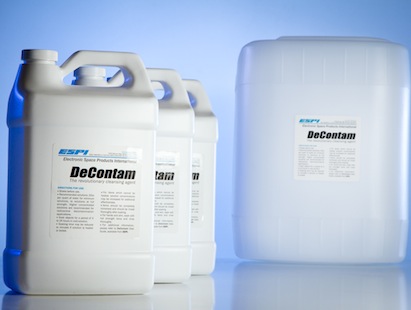Molybdenum Arc-Cast
Most of the pure molybdenum and molybdenum-base alloys used today are produced by the powder metallurgy method in which starting ingots are made by pressing and sintering molybdenum powder to accomplish both consolidation and purification. Molybdenum ingots can also be consolidated by vacuum arc casting, a method in which a preformed electrode is melted by arc formation in a water-cooled mold. The greatest advantage arc-casting offers is in its ability to provide large dense ingots. Mill products made from arc-cast ingots are specified when low gas content is desired. However, because of improvements in the technique of making pressed and sintered ingots, the gas content of both types of ingots are now about the same. After pressing and sintering, or arc-casting, molybdenum ingots are worked by forging, rolling, swaging, and drawing into various mill products. Molybdenum and its alloys are also readily extruded to form a variety of shapes.
There is very little difference in the physical properties of molybdenum produced from pressed and sintered ingot versus arc-cast ingot. The mechanical properties of molybdenum and molybdenum alloys mainly depend on the amount of working performed below the recrystallization temperature and on the ductile-to-brittle transition temperature. Compared to arc-cast products, bars or forgings of powder metallurgy products may exhibit greater tendencies to chip out at the edges and to develop slightly ‘pitted’ surfaces in turning, shaping and milling. The minimum recrystallization temperature for molybdenum is 900 oC. Arc-cast molybdenum is normally supplied in the stress-relieved condition.
Nominal Composition in Percentage:
C 0.010 Max
Fe 0.010 Max
Ni 0.002 Max
O 0.010 Max
N 0.0015 Max
Mo 99.97 Min
Mechanical Properties of Arc-Cast Molybdenum Bar (65 oC - 85 oC):
Tensile Yield Strength
Strength (0.2% Offset) Elongation
Diameter Minimum Minimum Minimum
Inches mm ksi MPa ksi MPa %
0.125" to 0.406" 3.2 - 10.3 90 620 75 515 30
Over 0.406" to 0.875" 10.3 - 22.2 90 620 75 515 25
Over 0.875" to 1.125" 22.2 - 28.6 85 585 70 485 25
Over 1.125" to 1.875" 28.6 - 47.6 75 515 65 450 20
Over 2.875" to 3.5" 73.0 - 88.9 65 450 55 380 10

 ALLOYS
ALLOYS 
